
Malnutrition is a common consequence of cancer and is associated with a loss of fat and muscle mass. Severe weight loss due to cancer is associated with a worsened prognosis of cancer, according to research. If malnutrition cannot be stopped, supplemental nutrition in the form of infusions through the veins is an option. Although this is an invasive therapy that requires regular medical and nursing monitoring, it can be provided to the patient at home, in the form of home parenteral nutrition (HPN).
"Often, however, adherence to standards of care and monitoring is difficult. This is compounded by the lack of nursing staff. From our experience, however, we know that good management is crucial to avoid serious complications," reports Ingeborg Rötzer, head of nutritional counseling at the NCT Heidelberg. Together with her colleague Mr. Wetzel-Fischer and in cooperation with physicians Haag and Dietrich, Rötzer now wants to use an app application for mobile devices to improve complication management in artificial nutrition at home and facilitate communication between patients and the nutrition team. The long-term aim of the project is to establish a standardized procedure for quality assurance in home parenteral nutrition therapy.
Soft tissue sarcoma: predicting treatment response and explaining resistance mechanisms.
Soft tissue sarcomas are rare tumors that account for about 1 percent of all new adult cancers in Germany. They arise from muscle, fatty tissue, connective tissue or vessels. "Soft tissue sarcoma is often diagnosed late and thus escapes early therapy because it goes unnoticed and causes no symptoms due to its often deep location," reports Dr. Christoph Heilig of the NCT Heidelberg. In the case of locally advanced or metastasized soft tissue sarcoma, surgery is usually not sufficient. Drug therapies are then used in an attempt to stop or at least slow down the growth and spread of the disease. In addition to classical chemotherapy, the tyrosine kinase inhibitor pazopanib has been available for this purpose for several years. While the drug achieves disease control of 4-6 months in most patients, a small group of patients benefit from the treatment for a very long time. The reasons for this are not known.
The team led by Dr. Heilig and PD Dr. Horak in the Department of Translational Medical Oncology hopes to gain a better understanding of the drug's mechanisms of action and resistance through a very precise genetic study of precisely these diseases that are particularly amenable to treatment with pazopanib. Due to the rarity of sarcoma diseases as well as an exceptional response to pazopanib, the study is being conducted as a nationwide project in close partnership with the patient organization "Das Lebenshaus".

Patients with soft tissue sarcomas who have been successfully treated with pazopanib for twelve months or more can be included in the study at one of the 11 sites of the German Cancer Consortium (DKTK) and thus actively contribute to clinical sarcoma research. In addition, the study within the NCT/DKTK MASTER program opens the possibility for the implementation of personalized therapy concepts as well as the participation in clinical therapy studies.
Familial colorectal cancer: identifying patients at high risk earlier
Up to 500,000 people in Germany are affected by Lynch syndrome. Thus, Lynch syndrome or Hereditary Non Polyposis Colon Carcinoma (HNPCC) is one of the most common hereditary tumor diseases. Most affected individuals have not yet been diagnosed. The disease is caused by a germline mutation of DNA repair genes. Lynch syndrome-associated tumors most commonly arise in the colon and endometrium, but can also affect other organs such as the stomach, small intestine, kidneys, ovaries, skin, and rarely the brain, making diagnosis even more difficult. In addition, affected individuals are at increased risk for the simultaneous occurrence of multiple cancers. Due to the high risk of developing the disease, especially at a young age, there is an urgent need for new early diagnostic methods.

Doctors and scientists Aysel Ahadova and Elena Czink therefore want to use a new blood test to identify those affected more quickly and in good time. To do this, they are taking advantage of the fact that DNA repair mechanisms are disturbed in Lynch syndrome. As a result, patients have altered proteins in their blood that are specific to the disease and can be recognized by the immune system. The blood test is designed to detect precisely this immune response in the blood of those affected with Lynch syndrome, thus enabling early diagnosis.
Thyroid nodules: Improving diagnostic confidence
Thyroid nodules occur frequently. In 80 to 90 percent of cases, thyroid nodules are benign, but in 10 to 20 percent of cases they can be malignant. "Using imaging and even after microscopic examination of the removed thyroid gland, it can be difficult to distinguish between benign follicular adenomas and malignant follicular carcinomas," says Dr. Katharina Kriegsmann from the Department of Hematology, Oncology and Rheumatology at Heidelberg University Hospital (UKHD). Methods that increase diagnostic certainty are therefore urgently needed.
Together with Dr. Mark Kriegsmann from the Institute of Pathology at the UKHD, the scientists want to use a new innovative method, imaging mass spectrometry, to link molecular and microscopic information from tissue samples of thyroid nodules. This will primarily objectify the diagnosis of follicular thyroid adenoma and carcinoma. Furthermore, new diagnostic and therapeutic targets can be identified.







